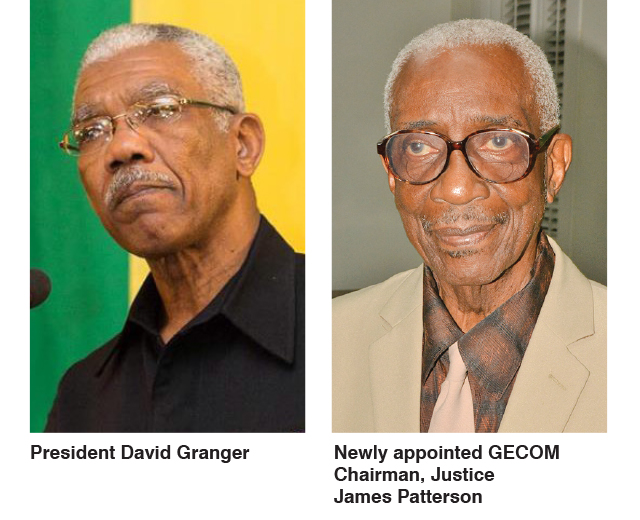Home Top Stories Int’l body warns against Granger’s growing dictatorial powers
…calls Patterson’s secret appointment an assault on democracy
The International Centre for Democracy (ICD) has called on Guyanese from all walks of life – at home and in the Diaspora – to put aside differences to work in solidarity to stop the consolidation of a dictatorship in Guyana since the country is poised to return to the pre-1992 days.
The clarion call came over the weekend in response to the secret appointment of Justice (rtd) James Patterson which the ICD says “may also be interpreted as a lack of political will by the President to involve the electorate and the Opposition, in what alternatively, ought to have been a transparent process.”
The ICD has since publicly called on the international community “to sanction President Granger and the Guyana Government for their blatant violation and disregard for the Constitution and for promoting dictatorship, racism and division among Guyanese.”
According to the International Democracy watchdog body, “we believe that since President Granger has declined to provide a legally sound justification for having declined the three lists comprising of 18 candidates nominated by the Opposition, his sudden appointment of Justice (Retired) James Patterson to the seat is not merely undemocratic, but wholly obstructive to the principles of inclusive governance.”
The body, in a missive, voiced its belief that the way the new Chairman of the Guyana Elections Commission (GECOM) has been appointed creates an environment of suspicion and distrust in Guyana, “a country that is already highly polarised… It also generates wider suspicion since there is still a very strong view among the Guyanese people at home and in the Diaspora that the 2015 elections were not entirely free and fair.”
The International Centre for Democracy has since registered its objection and condemnation of the undemocratic process that President Granger took in appointing the GECOM Chairman saying “the unilateral appointment of Mr Patterson as GECOM’s Chairman is a crippling blow to democracy in Guyana and worse further polarise our people.”
According to the ICD, Opposition Leader Bharrat Jagdeo has displayed patience and conducted wide consultation with both political and civil society and that the three lists submitted by the Opposition Leader contained names of distinguished Guyanese professionals and that each of the three lists contained names of persons qualified to be the chair of GECOM.
“The arbitrary rejection of the three lists of candidates submitted by the Opposition as provided for by Article 161 (2) of the Constitution breaches both the law and the spirit of the Constitution. It also demonstrates a lack of respect for well-qualified Guyanese professionals and render the appeal of the President for qualified Guyanese to return home a hallow request.”
The first list of names was submitted in December last year by Jagdeo and included Major General (retd) Norman McLean; Attorney and Chartered Accountant Christopher Ram; Business Executive Ramesh Dookhoo; Governance and Conflict Resolution Specialist, Lawrence Lachmansingh: Rights Activist Ryhaan Shah; and Professor James Rose.
This list was rejected by the President after the Opposition Leader submitted for consideration former appellate Judge BS Roy, former High Court Justice William Ramlall, former Magistrate and now practising Attorney Oneidge Walrond-Allicock, Attorneys Kashir Khan and Nadia Sagar, and former Guyana Defence Force Captain and businessman Gerald Gouveia for the post.
This was also rejected before Jagdeo on August 25, submitted a third list containing Joe Singh, a retired Guyana Defence Force Major General, who previously served as GECOM Chairman; former long-serving Magistrate Krishenndat Persaud; Attorneys Teni Housty and Sanjeev Datadin; pilot and biodiversity advocate Annette Arjoon-Martins; and Adventist pastor and agriculturalist Onesi La Fleur.
Subsequent to the resignation of former GECOM Chairman, Dr Steve Surujbally in February 2017, a collaborative engagement mandated by Article 160 of the Constitution was initiated between President Granger and the Leader of the Opposition, with the purpose of filling the vacant seat.
Since 1992, the appointment of the Chairman has been guided by the well-known Carter formula, whereby the Leader of the Opposition chooses six candidates and the President chooses one of the candidates as the Chairman. The Carter formula has become enshrined into the Constitution and is part of the law of Guyana.
During the process that started with the resignation of Dr Surujbally, President Granger changed the process, insisting that only he could determine who is “fit and proper”.
He also insisted initially that all the candidates nominated by the Leader of the Opposition must be a person who was a Judge or a person qualified to be a Judge.
The ICD has since observed that not only has the President unilaterally changed the requirements, he ignored the ruling of the Chief Justice, a ruling that confirmed the President was acting in contravention of the Constitution.
The Chief Justice had provided a ruling after a citizen asked the courts for an interpretation of the constitutional requirement for selecting the Chairman.
The International Center for Democracy maintains that the rigid adherence to the formula and the process is critical to generate confidence and trust in the electoral process.
“The behaviour of the President in disavowing both the Carter formula and the Constitution is an assault on Guyana’s democracy… The assault is even more egregious since the Chief Justice of Guyana offered the courts interpretation that was consistent with the practice since 1992 and with how the Leader of the Opposition today and in all instances in the past interpreted the Constitution,” the international body stated.
